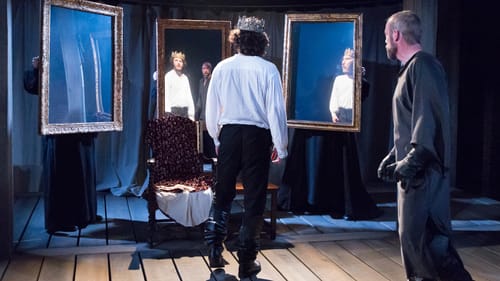Stay in the Loop
BSR publishes on a weekly schedule, with an email newsletter every Wednesday and Thursday morning. There’s no paywall, and subscribing is always free.
Revising Shakespearean history
Bill Cain's 'Equivocation' at the Arden

Equivocation by Bill Cain at the Arden Theatre Company is brilliant — witty, smart, well-acted — but it’s such a guy’s play that I kept wanting Judith (Campbell O’Hare), the sole female character, to actually take over and tell the men to grow up and stop fighting instead of dumping water on them and then soliloquizing about her role in life.
William Shagspeare (Eric Hissom), based on guess who, has been asked to write a play about the Gunpowder Plot against James I (Sean Lally with a Scottish accent) and his advisor, Sir Robert Cecil (Dan Hodge with a limp). Now Cecil wants to cement the king’s legacy through a play written by Shag, whose work, Cecil says, will last at least “50 years.”
But Shag is disturbed by some facts that don’t add up and is reluctant to do it. His fellow actors at the Globe Theatre, a “cooperative venture,” want the money so they encourage him, all except Sharpe (Sean Lally without the accent). So Shag takes it on, and we see parts of this play in progress, along with excerpts of King Lear with the king in diapers and his fellow actors equally unclothed, and eventually Macbeth, fortunately fully-clothed.
That we can follow the plot, which combines history, politics, and plays within the play, is a tribute to the writing. That all this is about the imagined circumstances of how Shagspeare came to write Macbeth is amusing. That women play no part in the shenanigans is annoying.
Some of the writing is about the creative process. Just as Bullets over Broadway at the Academy of Music is about ownership of a play that is rewritten by someone else, Shagspeare wrestles with writing a play on commission rather than on a subject he has chosen himself.
“Love and be silent”
There is also a message about Shagspeare’s relationship to his daughter, Judith, whom he wishes had died in place of his son. “A daughter’s job,” he tells us early on, “is to love and be silent,” and so Judith is constantly sent off stage where she is invisible as well as silent. When Shag looks forward to death as a way to reunite with his son, the advice he is given is to “look to your daughter and there you will see your son again.” Not the most empowering way of acknowledging her.
There is a lot of talk about theater. Actors are “words made flesh,” and theater “reduces reality to spectacle” making it a perfect “civil religion,” for example. And some wonderful reinterpretations of the meaning of Shagspeare’s plays — Judith describes Lear as a man who is responsible for the death of his three daughters whom we nevertheless end up pitying. There would be plenty to chew on afterward if only one could remember it all.

The actors, other than Hissom and O’Hare, all take on several parts, switching seamlessly between roles even without costume changes. Ian Merrill Peakes as both Richard, Shag’s partner, and the accused priest Henry Garnet, is so believable in his protestations of innocence, that we feel betrayed along with Shag when we hear he has confessed. In an Arden theater in-joke, he also gets to play a version of Macbeth, a role he played last season. Anthony Lawton is a solid Armin and a highly improbable red-robed Lady Macbeth.
Revenge, not truth
The set, by David P. Gordon, is basic, serving as theater, home, castle, dungeon, and gallows. We’re treated to a sword fight and two hangings, a disemboweling, and a beheading. Equivocation says that it’s about how to “tell the truth in difficult times,” but it seems more fixated on anger and revenge than on finding out the truth of anything.
In her final soliloquy — she hates soliloquies — Judith hints that she reconciles with her father and that his final four plays, which probably include The Winter’s Tale and The Tempest, were taken from her childhood fantasies. I don’t know whether to think that it’s nice he finally paid attention to her, or that, less nice, he took her work as his own.
For Steve Cohen's review, click here.
What, When, Where
Equivocation by Bill Cain. Terrence J. Nolen directed. Through December 13, 2015 on the Arcadia Stage at Arden Theatre Company, 40 N. 2nd Street, Philadelphia. ardentheatre.org or 215-922-1122.
Sign up for our newsletter
All of the week's new articles, all in one place. Sign up for the free weekly BSR newsletters, and don't miss a conversation.

 Naomi Orwin
Naomi Orwin